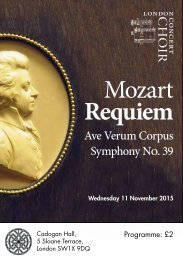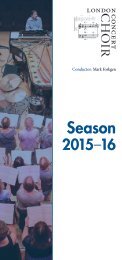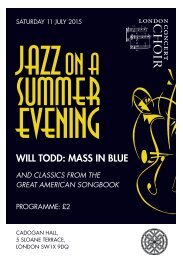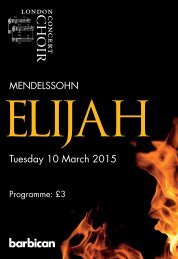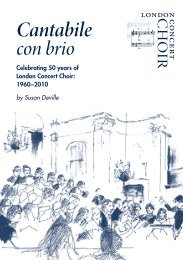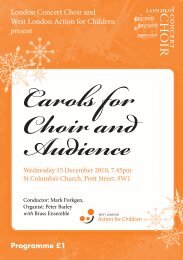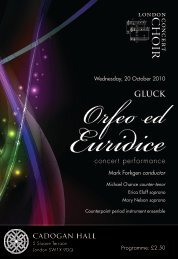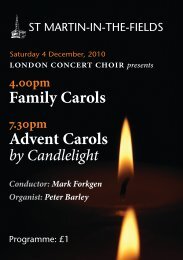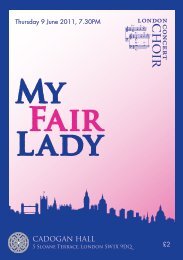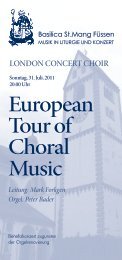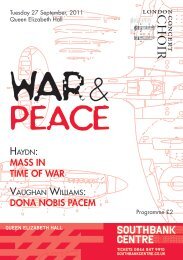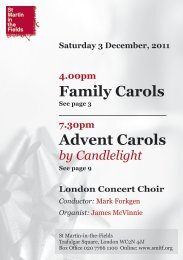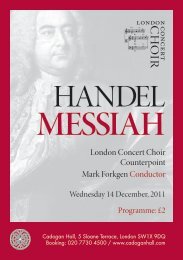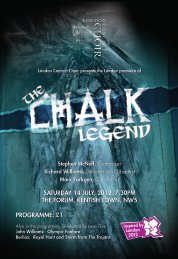You also want an ePaper? Increase the reach of your titles
YUMPU automatically turns print PDFs into web optimized ePapers that Google loves.
LONDON CONCERT CHOIR<br />
(LONDRA, INGHILTERRA)<br />
Diretto da: M o Mark Forkgen<br />
CONCERTO<br />
Una Celebrazione della<br />
Tradizione Corale Inglese<br />
Sab<strong>at</strong>o <strong>19</strong> Luglio <strong>2014</strong> ore 17.00<br />
DUOMO DI ORVIETO<br />
Avviso Sacro<br />
Ingresso gr<strong>at</strong>uito<br />
Free entrance
BENVENUTO<br />
• Si prega di spegnere i telefoni cellulari, i cercapersone e gli allarmi di orologi<br />
digitali.<br />
• Foto e registrazioni audio e video non sono consentite.<br />
• Please switch <strong>of</strong>f your mobile phone and pager, and any digital alarm on<br />
your w<strong>at</strong>ch.<br />
• Photography, and the use <strong>of</strong> any video or audio recording equipment,<br />
are forbidden.<br />
Programma disegn<strong>at</strong>o da Stephen Rickett e cur<strong>at</strong>o da Eleanor Cowie<br />
Programme designed by Stephen Rickett and edited by Eleanor Cowie<br />
London <strong>Concert</strong> Choir, società a responsabilità limit<strong>at</strong>a, registr<strong>at</strong>a in Inghilterra con il numero di<br />
registro 3220578 e come fondazione al numero di registro 1057242<br />
London <strong>Concert</strong> Choir - A company limited by guarantee, incorpor<strong>at</strong>ed in England<br />
with registered number 3220578 and registered charity number 1057242<br />
© London <strong>Concert</strong> Choir <strong>2014</strong><br />
www.london-concert-choir.org.uk<br />
PROGRAMMA<br />
Ascendit Deus<br />
Peter Philips (1560-1628)<br />
N<strong>at</strong>o a Londra, Philips lasciò l’Inghilterra<br />
da giovane per andare a lavorare in<br />
Francia, Spagna e Olanda, per infine<br />
stabilirsi ad Anversa; la sua musica corale<br />
è nella tradizione europea. Ascendit Deus<br />
è un mottetto per la festa di Pentecoste. Si<br />
compone in cinque parti, con due parti da<br />
soprano intrecci<strong>at</strong>e, e termina con Alleluias<br />
in una ball<strong>at</strong>a in terzo tempo.<br />
Born in London, Philips left England<br />
as a young man to work in France,<br />
Spain and the Netherlands, finally<br />
settling in Antwerp, and his choral<br />
music is in the European tradition.<br />
Ascendit Deus is a motet for the<br />
feast <strong>of</strong> Pentecost. It is scored in five<br />
parts, with two interwoven soprano<br />
parts, and ends with Alleluias in a<br />
dancing triple time.<br />
If ye love me<br />
Thomas Tallis (1505-1585)<br />
Come organista e compositore presso la<br />
Cappella Reale, Tallis fu al servizio di qu<strong>at</strong>tro<br />
monarchi, Enrico VIII, Edoardo VI,<br />
Maria I ed Elisabetta I, e fu costretto ad<br />
ad<strong>at</strong>tare continuamente il suo stile musicale<br />
per conformarsi ai cambiamenti dell’ortodossia<br />
religiosa dei tempi. Le sue prime composizioni<br />
sono complessi mottetti l<strong>at</strong>ini scritti per la<br />
Chiesa c<strong>at</strong>tolica, ma Se mi am<strong>at</strong>e è un’<br />
impostazione più semplice di un testo inglese,<br />
che riflette i principi liturgici protestanti.<br />
As organist and composer <strong>at</strong> the Chapel<br />
Royal, Tallis served four monarchs,<br />
Henry VIII, Edward VI, Mary I and<br />
Elizabeth I, and continually adapted his<br />
musical style to conform to the changing<br />
religious orthodoxy <strong>of</strong> the times. His<br />
earliest pieces are complex L<strong>at</strong>in motets<br />
written for the C<strong>at</strong>holic church, but If<br />
ye love me is a simpler setting <strong>of</strong> an<br />
<strong>English</strong> text, reflecting Protestant liturgical<br />
principles.
Ave verum corpus<br />
William Byrd (1540-1623)<br />
Byrd fu un allievo di Tallis e più tardi si unì<br />
a lui come organista congiunto presso la<br />
Cappella Reale. Insieme compilarono il<br />
Cantiones Sacrae, la prima grande raccolta<br />
di musica pubblic<strong>at</strong>a in Inghilterra. Ave verum<br />
Corpus è un mottetto devozionale per la festa<br />
del Corpus Christi.<br />
Byrd was a pupil <strong>of</strong> Tallis and l<strong>at</strong>er joined<br />
him as joint organist <strong>at</strong> the Chapel Royal.<br />
Together they compiled the Cantiones<br />
Sacrae (Sacred Songs), the first major<br />
printed collection <strong>of</strong> music to be published<br />
in England. Ave verum Corpus is a<br />
devotional motet for the Feast <strong>of</strong> Corpus<br />
Christi.<br />
Nolo mortem pecc<strong>at</strong>oris<br />
Thomas Morley (ca 1557-1602)<br />
Compositore, teorico, editore e organista,<br />
Morley divenne organista presso la C<strong>at</strong>tedrale<br />
di St Paul. Fu in grande parte responsabile per<br />
avere reso popolare il madrigale italiano in<br />
Inghilterra. Tuttavia, Nolo mortem pecc<strong>at</strong>oris<br />
è un mottetto solenne in l<strong>at</strong>ino e in inglese, in<br />
uno stile che ricorda Tallis.<br />
Composer, theorist, editor and organist,<br />
Morley became organist <strong>at</strong> St Paul’s<br />
C<strong>at</strong>hedral. He was largely responsible<br />
for popularising the Italian madrigal<br />
in England. However, Nolo mortem<br />
pecc<strong>at</strong>oris is a solemn motet in L<strong>at</strong>in and<br />
<strong>English</strong>, in a style reminiscent <strong>of</strong> Tallis.<br />
Never we<strong>at</strong>her-be<strong>at</strong>en sail<br />
Thomas Campion (1567–1620)<br />
Il poeta Thomas Campion scrisse sia le parole<br />
che la musica per le sue canzoni. Le cadenze<br />
della lingua inglese sono delic<strong>at</strong>amente<br />
rappresent<strong>at</strong>e nella musica di Naviga mai<br />
vinto dal tempo e la frase ‘O vieni presto,<br />
Signore misericordioso...’ ha un appassion<strong>at</strong>o<br />
e intenso senso di nostalgia.<br />
The poet Thomas Campion wrote both<br />
the words and the music for his songs.<br />
The cadences <strong>of</strong> the <strong>English</strong> language are<br />
sensitively captured in the music <strong>of</strong><br />
Never we<strong>at</strong>her-be<strong>at</strong>en sail and the<br />
phrase ‘O come quickly, gracious Lord...’<br />
has a passion<strong>at</strong>e intensity <strong>of</strong> longing.<br />
Thou knowest Lord / Hear my prayer<br />
Henry Purcell (1659-1695)<br />
Si tr<strong>at</strong>ta di due inni funebri scritti da uno dei<br />
più grandi tra i compositori inglesi. Purcell<br />
fu organista presso la Cappella Reale ed, al<br />
contempo, presso l’Abbazia di Westminster.<br />
Tu sai, Signore è una composizione che<br />
adotta un testo tr<strong>at</strong>to dal servizio di sepoltura<br />
Anglicano. Fu cant<strong>at</strong>a al funerale del<br />
compositore stesso, e da allora continua ad<br />
essere eseguita ad ogni funerale di st<strong>at</strong>o.<br />
Nel capolavoro di Purcell Ascolta la mia<br />
preghiera, le parole disper<strong>at</strong>e del testo sono<br />
associ<strong>at</strong>e ad un crescendo inesorabile e<br />
le armonie melanconiche culminano in un<br />
contrasto spettacolare.<br />
These are two funeral anthems by one<br />
<strong>of</strong> the gre<strong>at</strong>est <strong>of</strong> all <strong>English</strong> composers,<br />
who became organist <strong>of</strong> both the Chapel<br />
Royal and Westminster Abbey. Thou<br />
knowest, Lord, a setting <strong>of</strong> words from<br />
the Anglican burial service, was sung <strong>at</strong><br />
the composer’s own funeral and has been<br />
sung <strong>at</strong> every St<strong>at</strong>e funeral since.<br />
In Purcell’s masterpiece Hear my prayer,<br />
the despairing text is set to a relentless<br />
crescendo and the melancholy harmonies<br />
end on a spectacular discord.<br />
O clap your hands<br />
Orlando Gibbons (1583-1625)<br />
Gibbons fu un importante autore di<br />
composizioni per voce, tastiera e musica<br />
strumentale. Virtuoso della tastiera,<br />
Gibbons fu organista della Cappella Reale<br />
e successsivamente coprì lo stesso ruolo<br />
all’Abbazia di Westminster. Il gioioso ed<br />
energico inno O b<strong>at</strong>tete le mani per otto voci<br />
fu composto nel maggio del 1622, in seguito<br />
alla sua nomina al titolo di Dottore in <strong>Music</strong>a<br />
all’Università di Oxford.<br />
Gibbons was a leading composer <strong>of</strong><br />
vocal, keyboard and instrumental music,<br />
and a fine keyboard player, who was<br />
organist <strong>at</strong> the Chapel Royal and l<strong>at</strong>er<br />
<strong>at</strong> Westminster Abbey. The joyful and<br />
energetic anthem O clap your hands for<br />
eight voices was performed in May 1622<br />
when he was admitted to the degree <strong>of</strong><br />
Doctor <strong>of</strong> <strong>Music</strong> <strong>at</strong> Oxford University.
God so loved the world<br />
John Stainer (1840-<strong>19</strong>01)<br />
Stainer fu organista della C<strong>at</strong>tedrale di St<br />
Paul e più tardi divenne Pr<strong>of</strong>essore di <strong>Music</strong>a<br />
all’Università di Oxford. La bella meditazione<br />
Dio ha tanto am<strong>at</strong>o il mondo è tr<strong>at</strong>ta dal suo<br />
or<strong>at</strong>orio La Crocifissione.<br />
Stainer was organist <strong>of</strong> St Paul’s<br />
C<strong>at</strong>hedral and l<strong>at</strong>er became<br />
Pr<strong>of</strong>essor <strong>of</strong> <strong>Music</strong> <strong>at</strong> Oxford<br />
University. The beautiful medit<strong>at</strong>ion<br />
God so loved the world is from his<br />
Passiontide or<strong>at</strong>orio The Crucifixion.<br />
O taste and see<br />
Ralph Vaughan Williams (1872-<strong>19</strong>58)<br />
Anche se era agnostico, Vaughan Williams<br />
scrisse una grande quantità di musica<br />
religiosa. Il mottetto O gust<strong>at</strong>e e vedete fu<br />
composto per l’incoronazione della Regina<br />
Elisabetta II all’Abbazia di Westminster<br />
nel <strong>19</strong>53, quando egli aveva 80 anni. La<br />
bellezza dello sfondo è ad<strong>at</strong>ta perfettamente<br />
alle parole di consolazione del testo.<br />
Although he was an agnostic,<br />
Vaughan Williams wrote a gre<strong>at</strong><br />
deal <strong>of</strong> religious music. The motet O<br />
taste and see was composed for the<br />
Coron<strong>at</strong>ion <strong>of</strong> Queen Elizabeth II <strong>at</strong><br />
Westminster Abbey in <strong>19</strong>53, when<br />
he was 80 years old. The beauty<br />
<strong>of</strong> the setting m<strong>at</strong>ches the consoling<br />
n<strong>at</strong>ure <strong>of</strong> the text.<br />
Be<strong>at</strong>i quorum via<br />
Charles Villiers Stanford (1852-<strong>19</strong>24)<br />
N<strong>at</strong>o in Irlanda, Stanford fu Pr<strong>of</strong>essore<br />
di <strong>Music</strong>a all’Università di Cambridge e<br />
Pr<strong>of</strong>essore di Composizione al Royal College<br />
<strong>of</strong> <strong>Music</strong> di Londra per quasi 40 anni.<br />
Contribuì notevolmente alla rinascita della<br />
musica inglese alla fine del <strong>19</strong>° secolo. Il suo<br />
inno Be<strong>at</strong>i quorum via in sei parti, con sezioni<br />
separ<strong>at</strong>e di soprani e di bassi, è una delle sue<br />
composizioni più raffin<strong>at</strong>e.<br />
Irish by birth, Stanford was both<br />
Pr<strong>of</strong>essor <strong>of</strong> <strong>Music</strong> <strong>at</strong> Cambridge<br />
and Pr<strong>of</strong>essor <strong>of</strong> Composition <strong>at</strong><br />
London’s Royal College <strong>of</strong> <strong>Music</strong><br />
for nearly 40 years. He contributed<br />
gre<strong>at</strong>ly to the renaissance <strong>of</strong> <strong>English</strong><br />
music <strong>at</strong> the end <strong>of</strong> the <strong>19</strong>th century.<br />
His anthem Be<strong>at</strong>i quorum via in six<br />
parts, with divided sopranos and<br />
basses, is one <strong>of</strong> his most exquisite<br />
compositions.<br />
Steal away<br />
Michael Tippett (<strong>19</strong>05-<strong>19</strong>98)<br />
L’or<strong>at</strong>orio Un figlio del nostro tempo di Tippett<br />
è st<strong>at</strong>o scritto durante la Seconda Guerra<br />
Mondiale come un avvertimento contro<br />
l’oppressione. Egli incluse le ambientazioni<br />
di cinque spirituals per aggiungere una<br />
dimensione universale all’opera. Steal Away<br />
presenta la speranza di una vita migliore<br />
con Gesù come ‘la tromba risuona nella mia<br />
anima’.<br />
Tippett’s or<strong>at</strong>orio A Child <strong>of</strong> Our<br />
Time was written during the Second<br />
World War as a warning against<br />
oppression. He included settings<br />
<strong>of</strong> five spirituals to add a universal<br />
dimension to the work. Steal Away<br />
holds out the hope <strong>of</strong> a better life<br />
with Jesus as ‘the trumpet sounds<br />
within my soul’.<br />
Song for Athene<br />
John Tavener (<strong>19</strong>44-2013)<br />
Tavener è st<strong>at</strong>o fortemente influenz<strong>at</strong>o dalla<br />
musica della Chiesa ortodossa. La sua<br />
elegiaca Canzone per Athene, usando il testo<br />
della liturgia funebre ortodossa, fu scritta nel<br />
<strong>19</strong>93 in memoria di una giovane donna,<br />
Athene Hariades, che morì in un incidente<br />
in bicicletta. Qu<strong>at</strong>tro anni dopo fu cant<strong>at</strong>a<br />
al funerale di Diana, Principessa di Galles,<br />
all’Abbazia di Westminster.<br />
Tavener was gre<strong>at</strong>ly influenced by<br />
the music <strong>of</strong> the Orthodox Church.<br />
His elegaic Song for Athene, using<br />
words from the Orthodox burial<br />
service, was written in <strong>19</strong>93 in<br />
memory <strong>of</strong> a young woman, Athene<br />
Hariades, who had died in a cycling<br />
accident. Four years l<strong>at</strong>er it was<br />
sung <strong>at</strong> the funeral in Westminster<br />
Abbey <strong>of</strong> Diana, Princess <strong>of</strong> Wales.
Mark Forkgen Direttore<br />
Mark Forkgen dirige il London <strong>Concert</strong> Choir dal <strong>19</strong>96. Mark è anche<br />
direttore musicale del coro da camera Canticum, Direttore Principale e<br />
Consulente Artistico della Kokoro (New <strong>Music</strong> Group del Bournemouth<br />
Symphony Orchestra), direttore della Dorset Youth Orchestra e capo del<br />
dipartimento di musica alla Tonbridge School.<br />
Mark ha diretto numerose importanti orchestre britanniche, tra cui la<br />
Royal Philharmonic Orchestra, Orchestra <strong>of</strong> the Age <strong>of</strong> Enlightenment,<br />
Bournemouth Symphony Orchestra, City <strong>of</strong> London Sinfonia e <strong>English</strong><br />
Chamber Orchestra, ed è apparso in tutte le principali sale da concerto,<br />
tra cui la Royal Festival Hall, il Barbican e alla Royal Albert Hall.<br />
Ha condotto in Germania, Francia, Spagna, Belgio, Olanda e Repubblica Ceca. Ha d<strong>at</strong>o anche<br />
spettacoli di Stravinskij, Il Rito della Primavera, in Danimarca, così come il Messia e Israele in<br />
Egitto di Handel a Siena e al Festival Barocco di Viterbo.<br />
Uno specialista nel campo della musica corale e contemporanea, Mark Forkgen ha debutt<strong>at</strong>o più di<br />
100 opere, tra opere te<strong>at</strong>rali e opere contemporanee. Ha inoltre condotto spettacoli di classici della<br />
musica rock. Mark è anche st<strong>at</strong>o direttore e consulente artistico per una serie di importanti festival<br />
musicali. Le sue registrazioni con Canticum e Kokoro sono st<strong>at</strong>e altamente raccomand<strong>at</strong>e dalla radio<br />
BBC, così come dalla stampa musicale e nazionale.<br />
Mark Forkgen has been <strong>Music</strong> Director <strong>of</strong> London <strong>Concert</strong> Choir since <strong>19</strong>96. He is also <strong>Music</strong> Director<br />
<strong>of</strong> the Canticum chamber choir, Principal Conductor and Artistic Advisor <strong>of</strong> Kokoro (the Bournemouth<br />
Symphony Orchestra’s New <strong>Music</strong> Group), Conductor <strong>of</strong> Dorset Youth Orchestra and head <strong>of</strong> the music<br />
department <strong>at</strong> Tonbridge School.<br />
Mark has conducted a number <strong>of</strong> leading British orchestras, including the Royal Philharmonic Orchestra,<br />
Orchestra <strong>of</strong> the Age <strong>of</strong> Enlightenment, Bournemouth Symphony Orchestra, City <strong>of</strong> London Sinfonia<br />
and <strong>English</strong> Chamber Orchestra, and has appeared <strong>at</strong> all the major concert halls, including the Royal<br />
Festival Hall, the Barbican and the Royal Albert Hall.<br />
He has conducted in Germany, France, Spain, Belgium, Holland and the Czech Republic. He has also<br />
given performances <strong>of</strong> Stravinsky’s The Rite <strong>of</strong> Spring in Denmark, as well as Handel’s Messiah and<br />
Israel in Egypt in Siena and <strong>at</strong> the Viterbo Early <strong>Music</strong> Festival in Italy.<br />
A specialist in the field <strong>of</strong> choral and contemporary music, Mark Forkgen has premiered more than 100<br />
works, including the<strong>at</strong>re works and contemporary operas. His wide range <strong>of</strong> conducting also includes<br />
performances <strong>of</strong> rock music classics. Mark has been Conductor and Artistic Advisor for a number <strong>of</strong><br />
highly acclaimed festivals. His recordings with Canticum and Kokoro have been highly recommended<br />
by BBC Radio as well as in the musical and n<strong>at</strong>ional press.<br />
London <strong>Concert</strong> Choir<br />
London <strong>Concert</strong> Choir è st<strong>at</strong>o fond<strong>at</strong>o nel <strong>19</strong>60 come società corale con sede in una chiesa a West<br />
London. Il coro si è svilupp<strong>at</strong>o nel corso degli anni ed è st<strong>at</strong>o rilanci<strong>at</strong>o sotto il suo nome <strong>at</strong>tuale nel<br />
<strong>19</strong>86. Il coro ha ora circa 150 membri di ogni età e si distingue per il suo vasto repertorio musicale.<br />
Con il suo direttore musicale Mark Forkgen il coro si esibisce regolarmente in tutte le principali sale<br />
da concerto di Londra, tra cui il Barbican, la Royal Festival Hall, Queen Elizabeth Hall e Cadogan<br />
Hall, e nelle c<strong>at</strong>tedrali e chiese all’interno ed intorno alla capitale.<br />
Il coro ha inoltre effettu<strong>at</strong>o tournée in Francia, Germania, Olanda e Irlanda. Nel 2011 una<br />
performance del Requiem di Verdi a Londra con il Coro della Basilica di Augsburg è st<strong>at</strong>a seguita<br />
da un concerto congiunto dei due cori al Festival della Pace di Augsburg. Per celebrare il suo 50°<br />
anniversario nel 2010 il coro ha d<strong>at</strong>o due performance del War Requiem di Britten. Grandi opere<br />
nelle stagioni precedenti hanno incluso la Missa Solemnis di Beethoven e la Sinfonia del Mare di<br />
Vaughan Williams.<br />
Su una scala più piccola, LCC ha eseguito impostazioni raramente ascolt<strong>at</strong>e della liturgia ortodossa russa,<br />
e la Petite Messe Solennelle di Rossini. Spettacoli di musica barocca includono il Messia di Handel, la<br />
Passione secondo M<strong>at</strong>teo e l’Or<strong>at</strong>orio di N<strong>at</strong>ale di Bach. <strong>Concert</strong>i di opere e musical hanno incluso Orfeo<br />
e Euridice di Gluck, Didone ed Enea di Purcell, e Porgy and Bess di Gershwin.<br />
Il coro dà spesso concerti per beneficenza ed ha commission<strong>at</strong>o una serie di nuove opere.<br />
London <strong>Concert</strong> Choir was founded in <strong>19</strong>60 as a choral society based in a West London church.<br />
It grew in size over the years and was relaunched under its present name in <strong>19</strong>86. The choir now<br />
has around 150 members <strong>of</strong> a wide range <strong>of</strong> ages and is notable for its unusually broad musical<br />
repertoire. With its <strong>Music</strong> Director Mark Forkgen the choir regularly appears <strong>at</strong> all the major London<br />
concert venues, including the Barbican, Royal Festival Hall, Queen Elizabeth Hall and Cadogan Hall,<br />
and in c<strong>at</strong>hedrals and churches in and around the capital.<br />
The choir has also toured to France, Germany, the Netherlands and Ireland. In 2011 a London<br />
performance <strong>of</strong> Verdi’s Requiem with the Augsburg Basilica Choir was followed by a joint concert<br />
<strong>at</strong> the Augsburg Peace Festival. To celebr<strong>at</strong>e its 50th anniversary in 2010 the choir gave two<br />
performances <strong>of</strong> Britten’s War Requiem. Major works in earlier seasons include Beethoven’s Missa<br />
Solemnis and Vaughan Williams’ Sea Symphony.<br />
On a smaller scale, LCC has sung rarely-heard settings <strong>of</strong> the Russian Orthodox liturgy, and Rossini’s<br />
Petite Messe Solennelle. Performances <strong>of</strong> Baroque music include Handel’s Messiah and Bach’s St<br />
M<strong>at</strong>thew Passion and Christmas Or<strong>at</strong>orio. <strong>Concert</strong> performances <strong>of</strong> operas and musicals have included<br />
Gluck’s Orfeo e Euridice Purcell’s Dido and Aeneas and Gershwin’s Porgy and Bess. The choir <strong>of</strong>ten<br />
gives concerts for charity and has commissioned a number <strong>of</strong> new works.
Mark Forkgen <strong>Music</strong> Director<br />
James Longford Principal Accompanist<br />
Fabyan Evans Chairman<br />
Tim Thirlway <strong>Concert</strong> Manager<br />
Barbara Whent Treasurer<br />
Stephen Rickett Design and Communic<strong>at</strong>ions<br />
Jennifer Greenway Membership<br />
Eleanor Cowie Publicity<br />
Simon Livesey Company Secretary<br />
Soprano<br />
Gillian Bibby<br />
Eleanor Cowie<br />
Susan Deville<br />
Emma Dixon<br />
Emily Dresner<br />
Serena Ede<br />
Mary Forkgen<br />
Lisa Gardner<br />
Jennifer Greenway<br />
Laura Holland<br />
Christine Ingram<br />
Jane Joyce<br />
Anna Kosicka<br />
Susanna Lutman<br />
Stephanie Moussadis<br />
Margaret Perkins<br />
Jutta Raftery<br />
Caroline Sheppard<br />
Teresa Tilden<br />
Emily Tuite<br />
Janet Wells<br />
Julie Wilson<br />
Alto<br />
Frances Cave<br />
Lucy Charman<br />
Carys Cooper<br />
Deborah Curle<br />
Georgie Day<br />
K<strong>at</strong>hleen Dormer<br />
Rebecca Foulkes<br />
Georgina Furr<br />
Anna Garnier<br />
Mary Glanville<br />
Ruth Grychtol<br />
Muriel Hall<br />
Penny H<strong>at</strong>field<br />
Chrina Jarvis<br />
Chris Joseph<br />
Sabine Koellmann<br />
Joanna Kramer<br />
Lorna Lewis<br />
Bridget Maidment<br />
Gillian Perry<br />
K<strong>at</strong>ja Pluto<br />
Dubravka Polic<br />
Tabitha Strydom<br />
K<strong>at</strong>e Tranter<br />
Rachel Vroom<br />
Gabriel West<br />
Barbara Whent<br />
Belinda Whittingham<br />
June Williams<br />
Tenor<br />
David Broad<br />
Roy Carryer<br />
Dave Dosoruth<br />
James Ede<br />
Fabyan Evans<br />
David Ireland<br />
Carolyn Knight<br />
Ian Leslie<br />
Stephen Rickett<br />
Tim Steer<br />
Barry Sterndale-Bennett<br />
Tim Thirlway<br />
Bass<br />
Colin Allies<br />
Richard Burbury<br />
Andrew Cullen<br />
Albert Edwards<br />
James Finlay<br />
Nigel Grieve<br />
Ian Judson<br />
Robert Kealey<br />
Stefan Klaazen<br />
Angus Macdonald<br />
Ben Martin<br />
Christopher Powell-Smith<br />
Anthony Sharp<br />
Ryszard Stepaniuk<br />
William Tilden<br />
Tony Trowles<br />
Dai Whittingham




